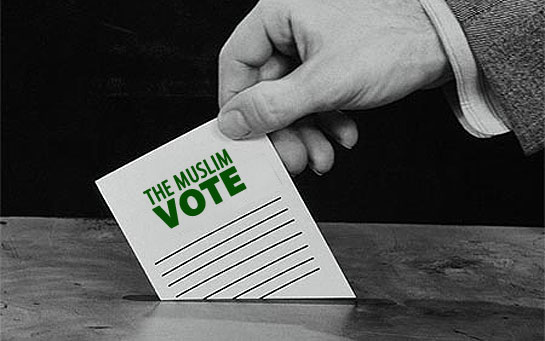
A recent report on the political trends and attitudes of the Muslim American community has become a hot topic for Muslim organizations.
The Director of Research of the study, Farid Senzai wrote an opinion piece based on the study’s findings, that was published in the New York Times detailing the potential of the “Muslim swing vote.”
The report’s findings, and his subsequent op-ed suggest that because there is a high concentration of Muslim residents in swing states, the Muslim vote could in fact play a decisive role in the upcoming presidential elections.
While the statistical potential may be there, the presence in the voting booth raises the formidable question of whether or not that potential may become a reality.
“So far we don’t have any reliable statistics for what percentage of Muslims actually vote. We know that it is not as good as other communities that have become more politically engaged over a longer period of time,” said Imad-ad-Dean Ahmad, President and Director of Minaret of Freedom Institute, in Bethesda Maryland.
The Muslim vote has been cast in the limelight for the past two presidential elections where foreign policy rhetoric, often relating to countries of origin for the large Muslim immigrant population, was primary on presidential platforms. As a result, the majority Muslim vote shifted from the right to left.
This election, Ahmad said, may create another shift in political party affiliation when it comes to a potential Muslim bloc vote.
“The surprise to watch for is the willingness of Muslims to mobilize behind a third party candidate,” said Ahmad.
Though third party candidates have often been seen as spoilers, Ahmad believes they are now being seen as positions of leverage.
“[Muslims are beginning to understand that] the third party candidate actually has more of an impact without even winning than if he did win,” he said. “The Socialist party never won any significant elections but Franklin Roosevelt adopted every single item on their platform [out of] fear that [socialists] would sway people toward Republicans.”
This type of concern created by a third party, Ahmad said provides leverage for the American Muslim community, leverage that he feels other significant minority populations have lost over the years.
“The African Americans are much more populous than the Muslims and yet the Democratic party is so sure that they will not vote for the Republican party that they don’t deliver [on their promises],” he said.
While the study provides a new and comprehensive look on data collected over the years, the potential of the Muslim swing vote may have yet to be fully understood. Still, some feel that the value of the study can be found simply in its existence.
“I think it will motivate [Muslims] and the fact of the matter is that not only are just the Muslims [learning what] the study says but politicians are realizing it too,” said Rafi Ahmed, a local civic activist. “Politicians know what kind of power Muslim voters have.”
The study was released by The Institute for Social Policy and Understanding is the first of its kind, surveying American Muslims and analyzing data categorized by racial and ethnic background, state of residence, and education level, among other categories.
Much of the analyzed data was collected by the Muslims in the American Public Square (MAPS), the Pew Research Center and the Muslim American Public Opinion Survey (MAPOS) between 2001 and 2011.
According to the study, there are 1.2 million registered Muslim voters. Still, questions remain as to the number of Muslims who cast their vote.
“It all depends on the masajid,” said Rafi Ahmed.
It does, according to the study. Findings suggest a correlation between the level of religiosity of a Muslim and their likelihood to vote.
“Low voter turnout from our community always makes [a swing vote] an improbability. We seriously need educating [of] our community. Some knowledgeable people argue that there is no point in choosing between the two evils, but I think we should seriously give it a thought when we have a choice, someone like Dr. Ron Paul as a candidate. My understanding is that reasonable people have always higher chances of getting on or staying on the right path insha-Allah,” said Shahzad Ahmad of Baltimore Maryland.
Much larger minority groups are poised to be decisive voters as well this election where hot button issues like abortion, immigration and unemployment rates impact many more than issues that are more immediately associated with the American Muslim community.









Comments powered by CComment